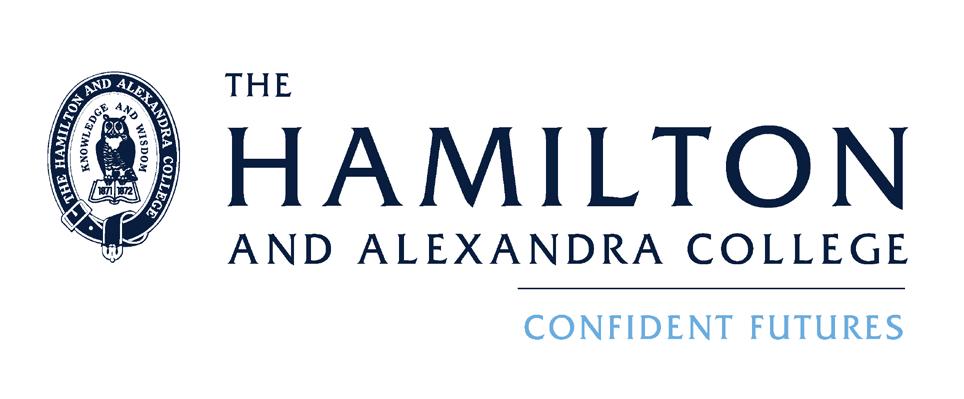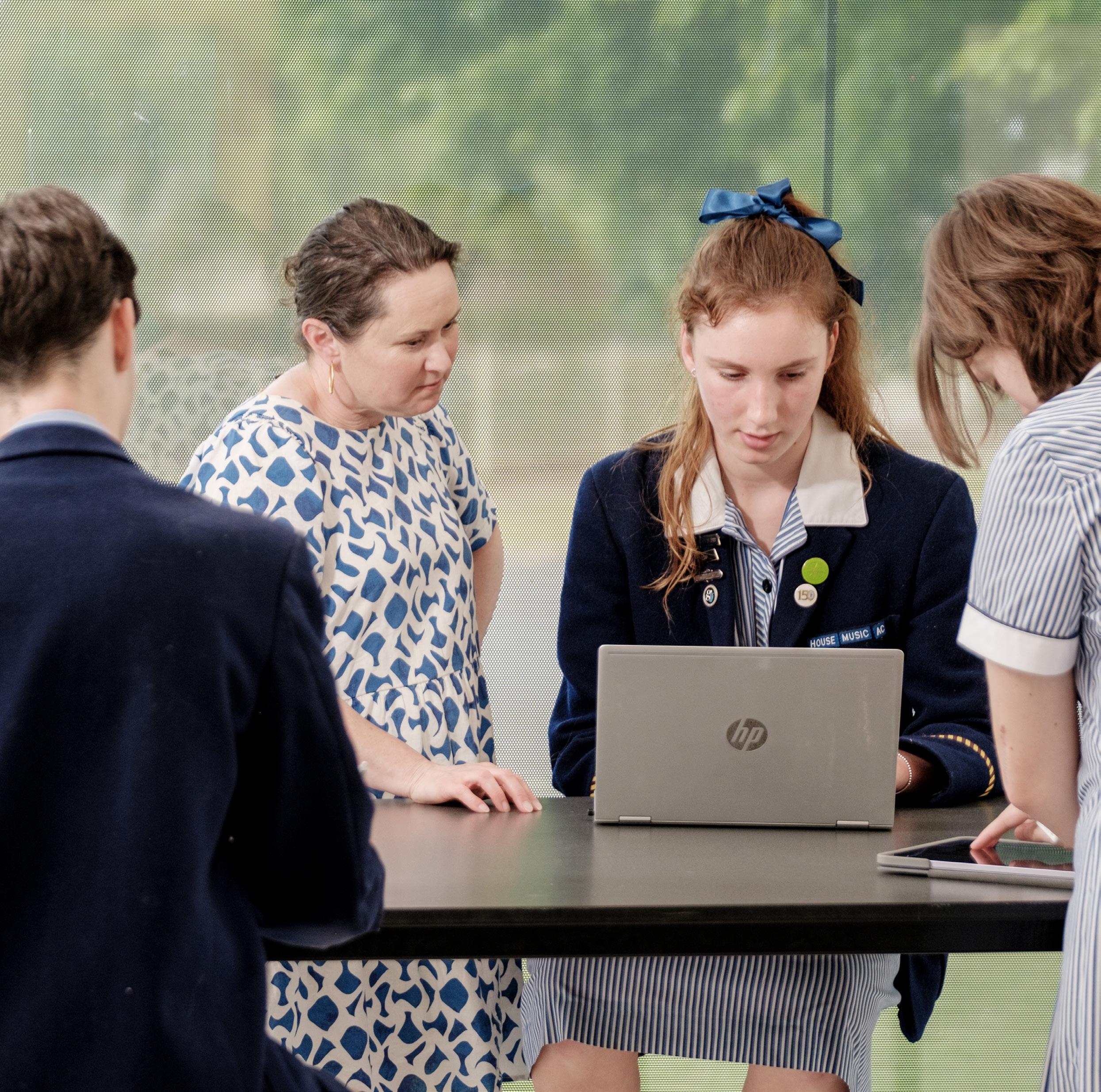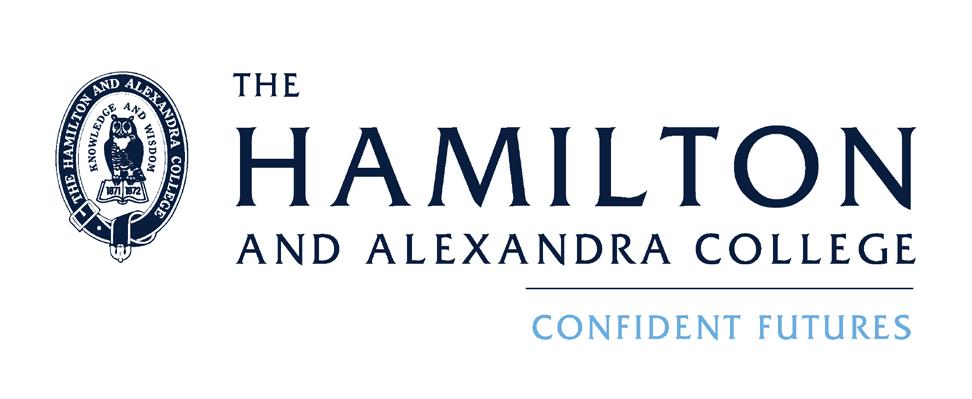
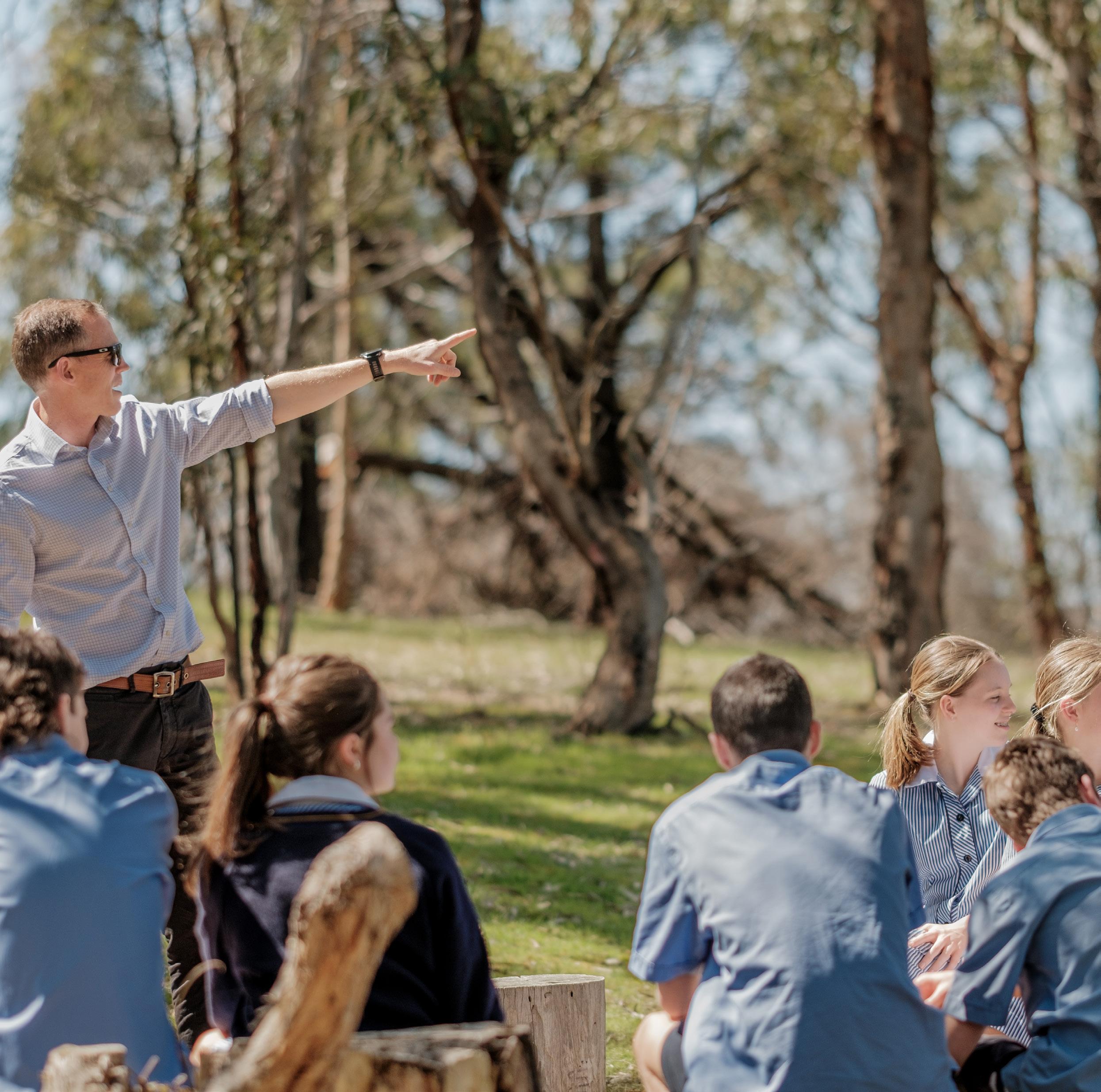




We are pleased to present this report on 2024 at The Hamilton and Alexandra College. The year was one in which we reasserted the foundations of our purpose and ethos through the publication of our 2024-2028 Strategic Plan. Our College is and will remain an academic school, providing a liberal education which is both traditional and enduring, in a regional context of a deeply connected school community. 2024 showed this identity strongly clearly.
The 2024-2028 Strategic Plan was launched in Term One, and is underpinned by four pillars: Exemplary Teachers and Staff and Sustainable Resourcing, which enable Exceptional Student Futures and a Rich Community of Service.
Our NAPLAN and VCE results are strong and improving, the opportunities provided to students are more than first-rate for a school of any size, and our community continues to flourish and contribute positively to our local area. This report carries many examples of 2024’s achievements in each of these areas, and provides the required metrics
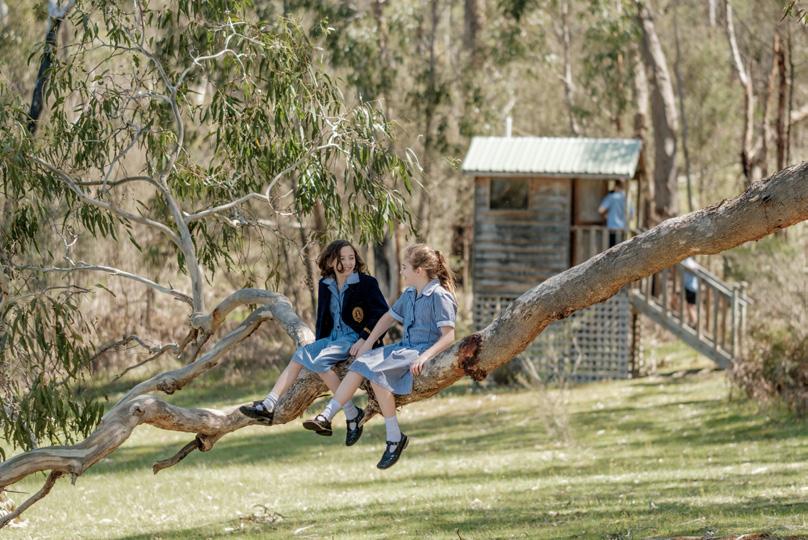
and mandated information. But, of course, schools are more than the percentages and figures we quantify and present in reports. They are the amalgam of these elements, animated by human connections and by a sense of belonging to a history of shared and on-going endeavour.
So, in what ways in 2024 did we add value, enjoyment and liveliness to the experience of each student at College? 2024 saw us:
Move forward with Optimism by planning for capital works programs:
• in the Middle Years landscaping project,
• for a new undercover arena in our Equestrian Centre, and
• at our Mirranatwa outdoor education facility.
Show Compassion through:
• community service initiatives that involved all students across the school
• the implementation of a Junior School scholarship, allowing access to Myrniong’s wonderful learning environment
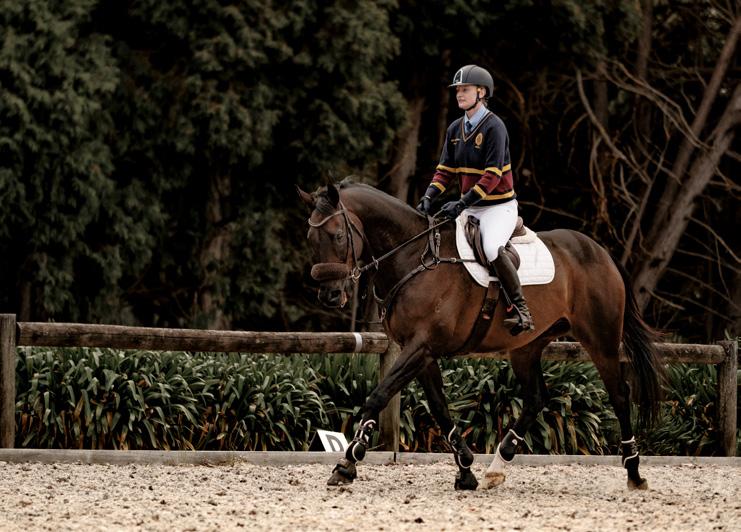
Develop and demonstrate Gratitude by serving others locally and internationally, including:
• In the local community at Mulleraterong, The Birches, the Uniting Church Food bank and by working with local sustainable food producers
• on our first Year 9 Experience program to Vietnam where our students worked for three days in the village of Na Boi and completed landscape regeneration in Hoi An.
Reaffirm the importance of Respect by:
• maintaining unapologetically high standards for student behaviour and conduct;
• consistently focussing on international cultural connections and exposure. In addition to the first Year 9 Vietnam program, we offered our first trip in the new suite of Co-curricular Global Tours, when we sent 11 students to a Yale Model UN Conference in Brussels.
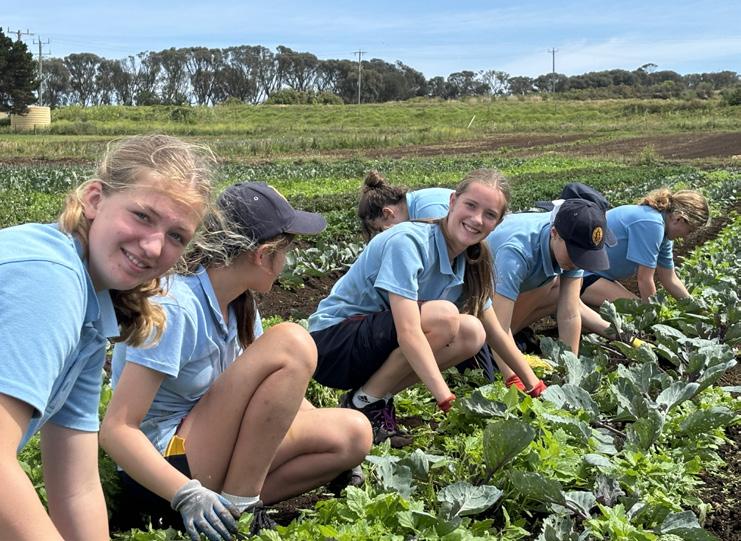
EXEMPLARY TEACHERS AND STAFF
Develop Resilience by:
• participating in a wide range of cocurricular camps and programs, from ELC all the way through to Year 12. Outdoor education and education in the outdoors are at the heart of our approach to developing student resilience, competence and responsibility.
• examining and focussing on the risks and known harms of a phone-based childhood, and providing opportunities for students to engage with one another and their world, free of the tether of a smart phone. In 2024 we asserted firmly that schools must be part of the societal response to managing phone addiction and increasing students’ understanding that they are resilient enough to live without them for periods of time.
While we were firmly focussed on initiatives that look to the future of the College, we also paused in 2024 to reflect on our progress so far.
SUSTAINABLE RESOURCING
EXCEPTIONAL STUDENT FUTURES
Using the ISV Lead Survey suite as our reflection instrument, we found that the College:
• remains above ISV means on most measures and across most survey groups
• is consistently above the means for ‘similar schools’ as determined by ISV
• showed improvements in all domains since the last survey in 2022, and
• achieved particularly positive parent, Year 6 and Year 12 feedback
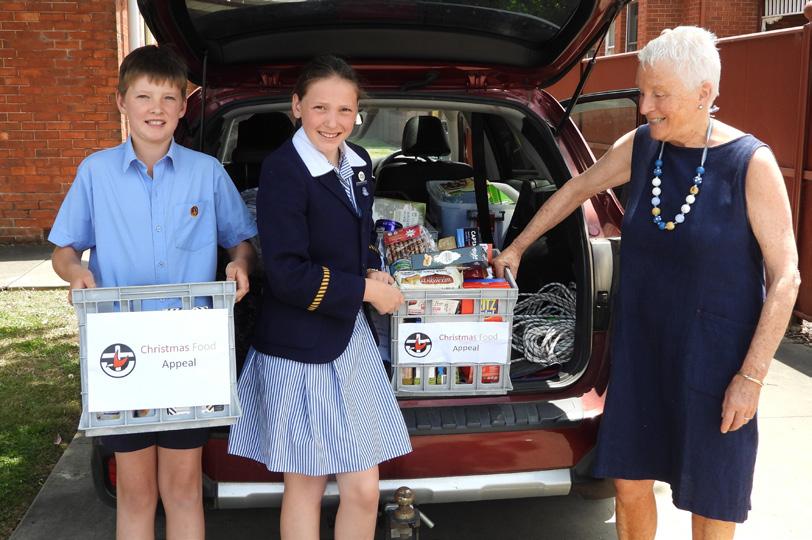
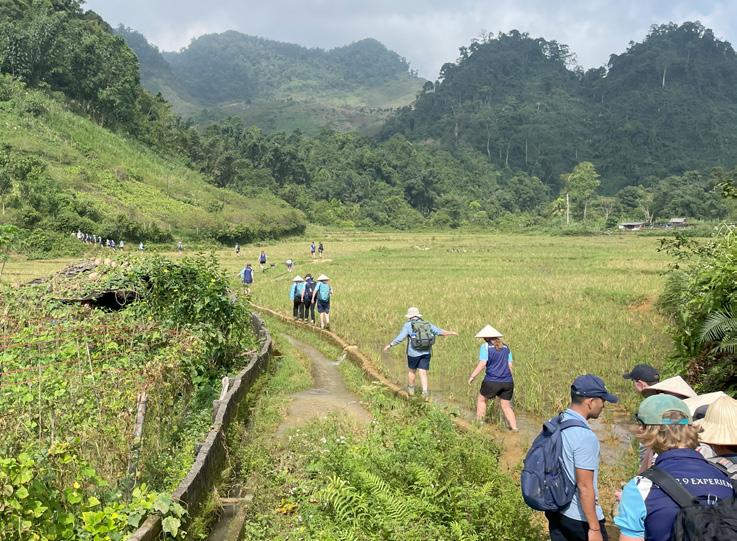
2024 was a year in which we reasserted and rearticulated our sense of who we are and who we would like to be as a school.
As we move in these directions, I commend this report to you as a snapshot of all that has been achieved at The Hamilton and Alexandra College in 2024.
Dr Michael Horne Principal
Rosemary Merrin Board Chair
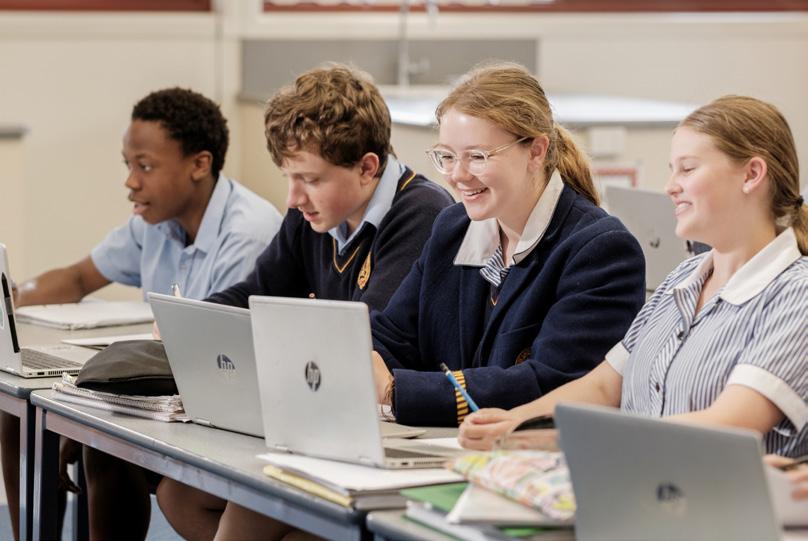
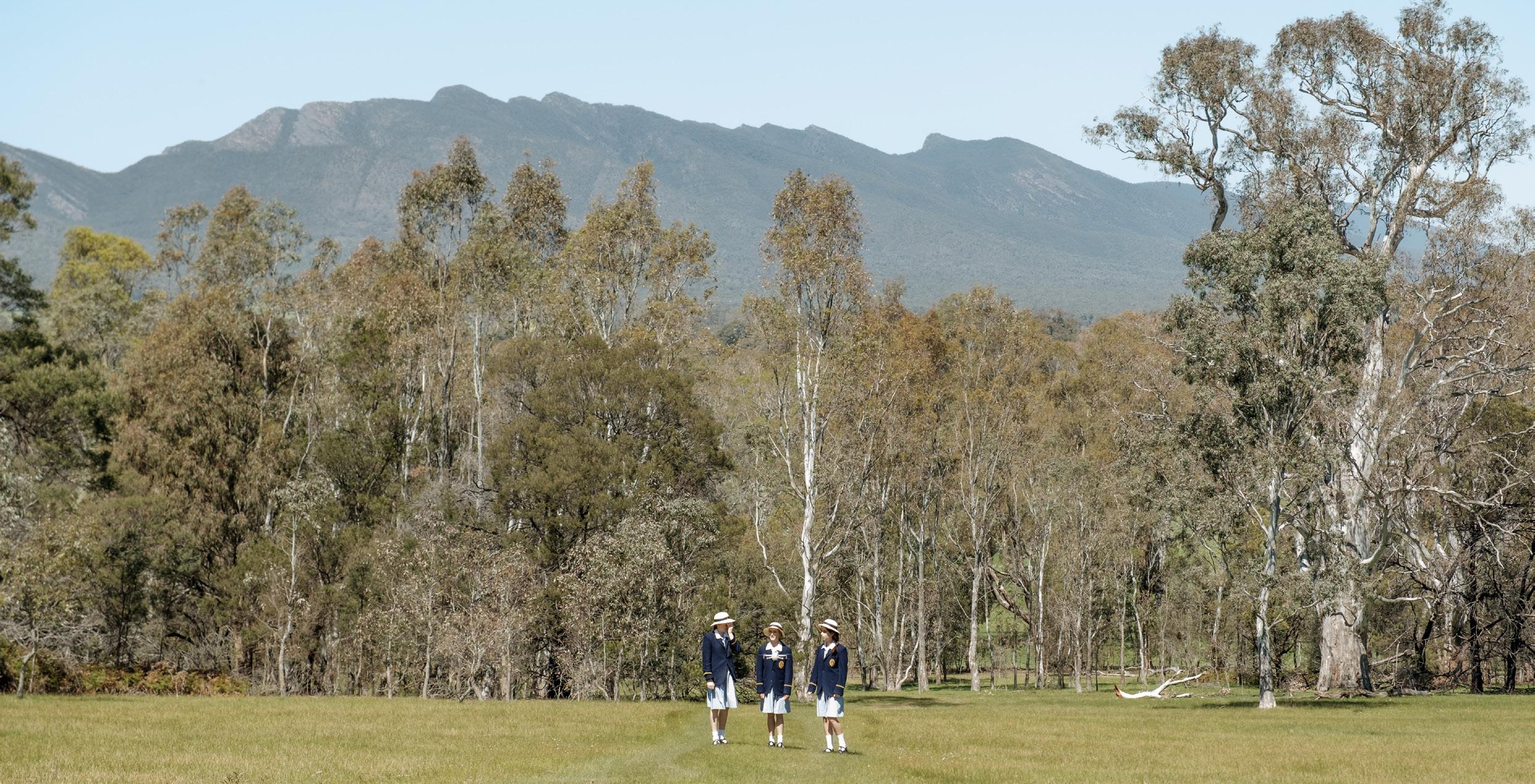
This report relates to The Hamilton and Alexandra College 2024 year. It contains performance information for parents and stakeholders, as well as information that complies with the State and Federal reporting requirements.
Since 1872, The Hamilton and Alexandra College has proudly offered personalised learning to students. The College is a non- selective, coeducational, independent day and boarding school, catering to around 470 students from our Early Learning Centre (ELC) to Year 12.
The College has a strong tradition of academic, sporting, music and performing arts excellence. Students access a vast range of subjects, inside and out of the classroom, allowing each child to discover their own study pathway, suited to their strengths and interests. The school
environment nurtures academic opportunities and delivers programs designed to encourage optimum individual achievement and personal development and ultimately fosters confident futures for all students.
We also promote a global approach to education, hosting an international student program. This was impacted significantly by the Covid-19 pandemic, however we have been working with international agents to rebuild our international boarding program and have experienced an uplift in international enrolments.
The College is located in Hamilton, in Western Victoria, accessible from both Melbourne and Adelaide. The Middle/ Senior and Junior/Boarding campuses are set on two beautiful, spacious and safe locations in walking distance of each other.
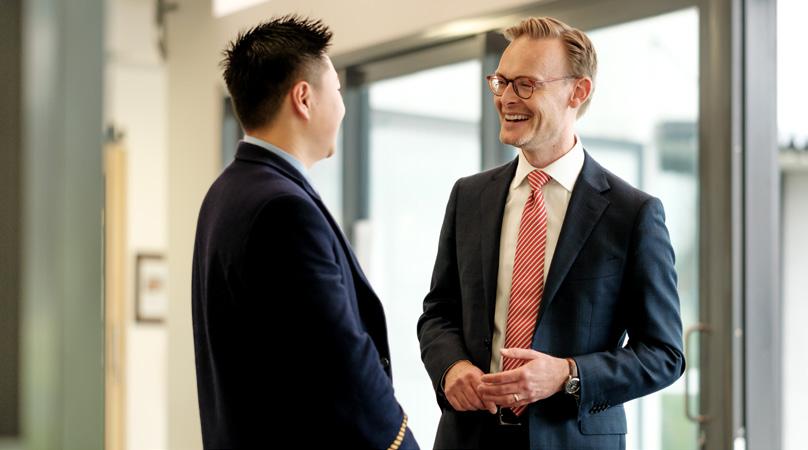
Traditionally, the College student population has been Anglo Celtic, reflecting the western Victoria demographic; however, our region is increasingly welcoming new families with varied origins and we are proud that our school community is reflecting this diversity. In addition, our international students enrich us by introducing their cultural experiences. Whilst these cultural changes are noticeable within the school community, the vast majority of our students speak English at home and most students come from families with a Christian faith background.
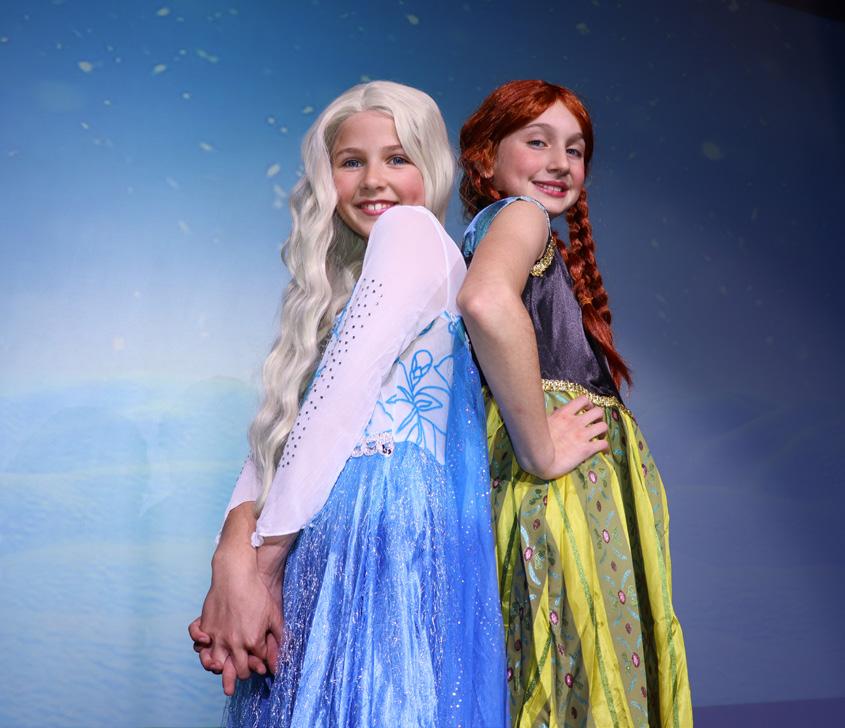
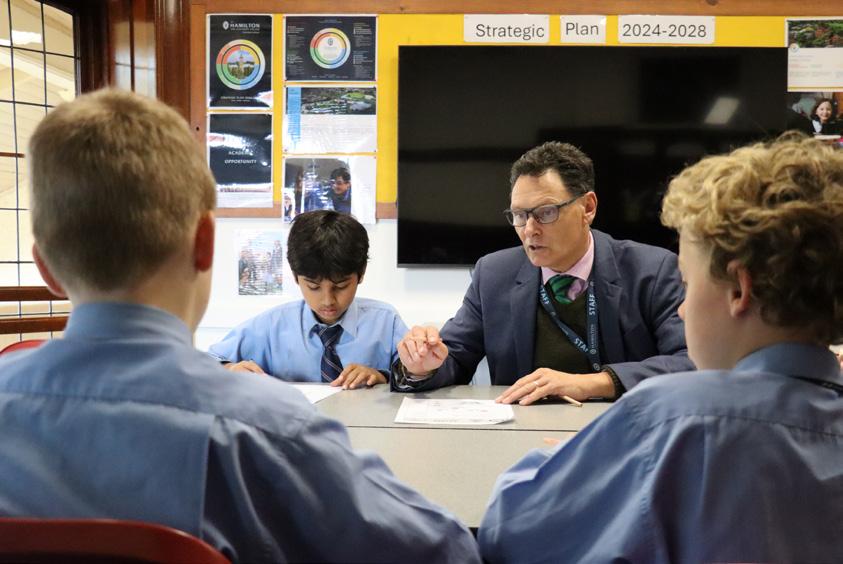
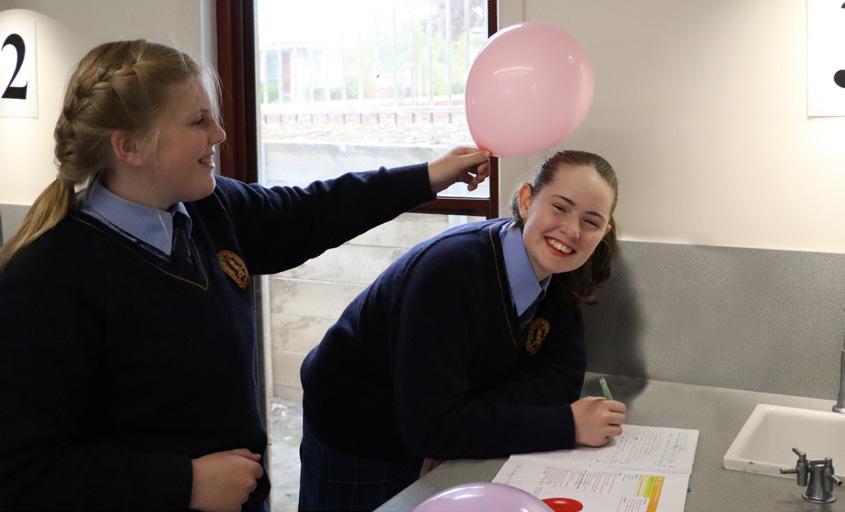
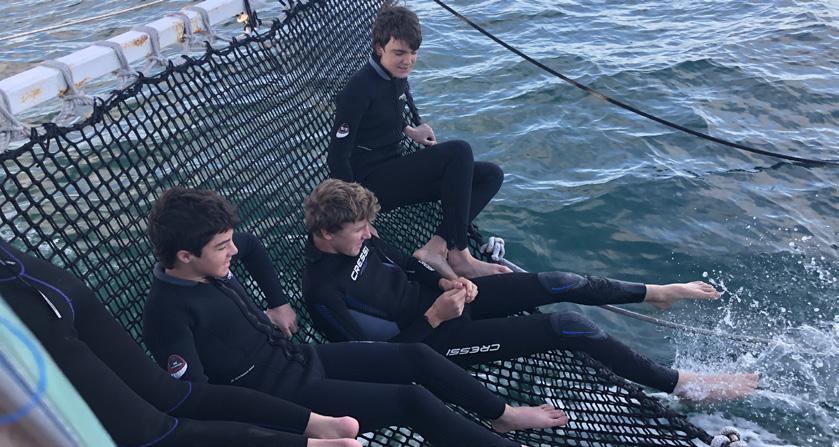
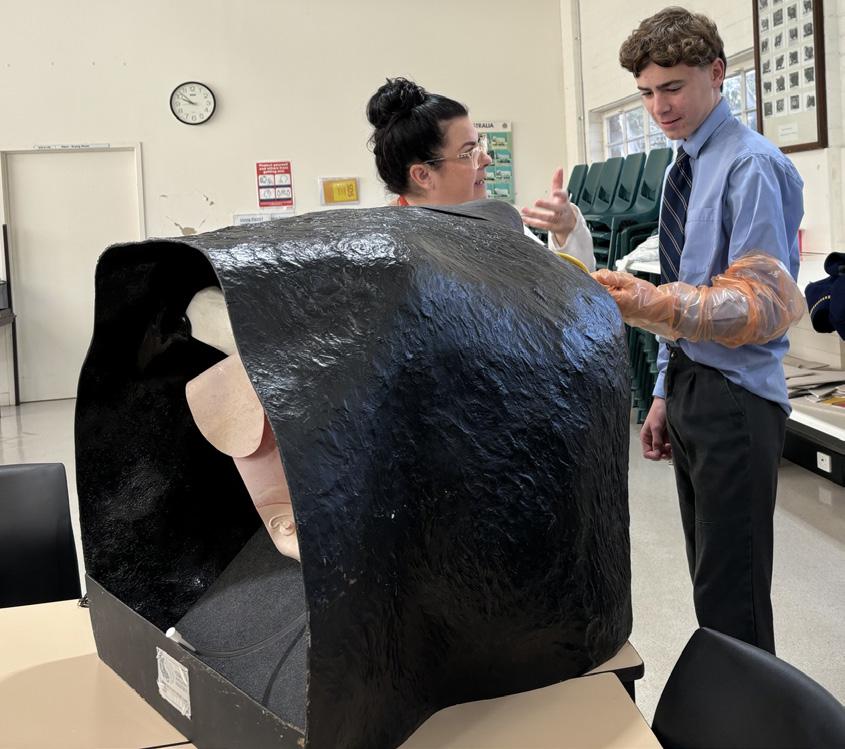
The College offers broad academic and co-curricular programs with a strong emphasis on individual attention and pastoral care. There is a wide range of opportunities in sport, equestrian, music, outdoor education, drama, leadership, hospitality, art, community service and public speaking.
For our Junior School students, we believe in building strong learning foundations across all programs and we seek to deliver a comprehensive and relevant curriculum in the early formative years. This begins with the Reggio Emilia play-based program in the Early Learning Centre and continues through to a more structured learning model by Year 6. All students have leadership opportunities and access a service learning program through the SRC and KidsMatter groups.
At the Senior School, learning is transformational. Each student’s learning program is individualised and it is designed to give them agency and the opportunity to direct their own learning pathway as they participate in the Engage, Explore, Emerge curriculum programs.
Year 7 participate in Engage, which supports their transition to senior school and engagement with learning. Students build a solid foundation through a range of subjects whilst consolidating routines for effective learning and building character and knowledge.
Year 8 and 9 is called Explore because they access a wide choice of elective subjects and start to focus on their interest areas, character strengths and passions.
Years 10, 11 and 12 are in Emerge, they have highlighted their pathways and are concentrating on developing a strong and targeted education for their VCE.
We also offer several Vocational Education and Training (VET) courses, such as Engineering, Agriculture, Hospitality, Equine, Building and Construction, and Beauty, working closely with registered organisations to deliver them, including our local partners Rural Industries Skills Training (RIST) and South West Tafe.
Our academic results identify the College as the region’s top performer at VCE and other levels, and in the top regional schools nationally. In the past decade, our mean ATAR score has been 74.2.
Since 2004, we have spent over $28 million on College infrastructure –completing the Year 12 Common Room, Year 12 Macdonald and Speirs Boarding House extensions and an onsite Director of Boarding residence, refurbished the Senior School Library, constructed the Middle Years Positive Education Centre, the Kantor Family Music and Performing Arts Centre, the Visual Arts Centre, the Geoff Handbury Sports Centre, the Helen Handbury Science Centre, and the Neil MacLean Hockey Field. Our facilities provide best-in-class learning opportunities for our students, both in academia and co-curricular activities.
Planning was well underway in 2024 for a competition sized undercover equestrian arena and for an upgraded outdoor play and learning space for the Middle Years campus.
We manage student absences proactively. Parents are contacted in the morning for any unannounced absences. Frequent absences are monitored and followed up by the Head of the relevant campus if necessary.
Total teaching days 180
Total additional staff days 8 (student-free)
*Many staff members work across more than one area listed below.
Senior School Teaching Staff - 41
Female 13 full time 13 part time
Male 11 full time 4 part time
Early Learning Centre and Junior School Teaching staff – 18
Female 3 full time 12 part time
Male 1 full time
Administration staff – 14
Female 3 full time 10 part time
Male 1 full time
Building and Technology staff – 7
Learning Support / School Counsellor / Nurses – 10 Female 1 full time
Boarding House staff – 18 Female
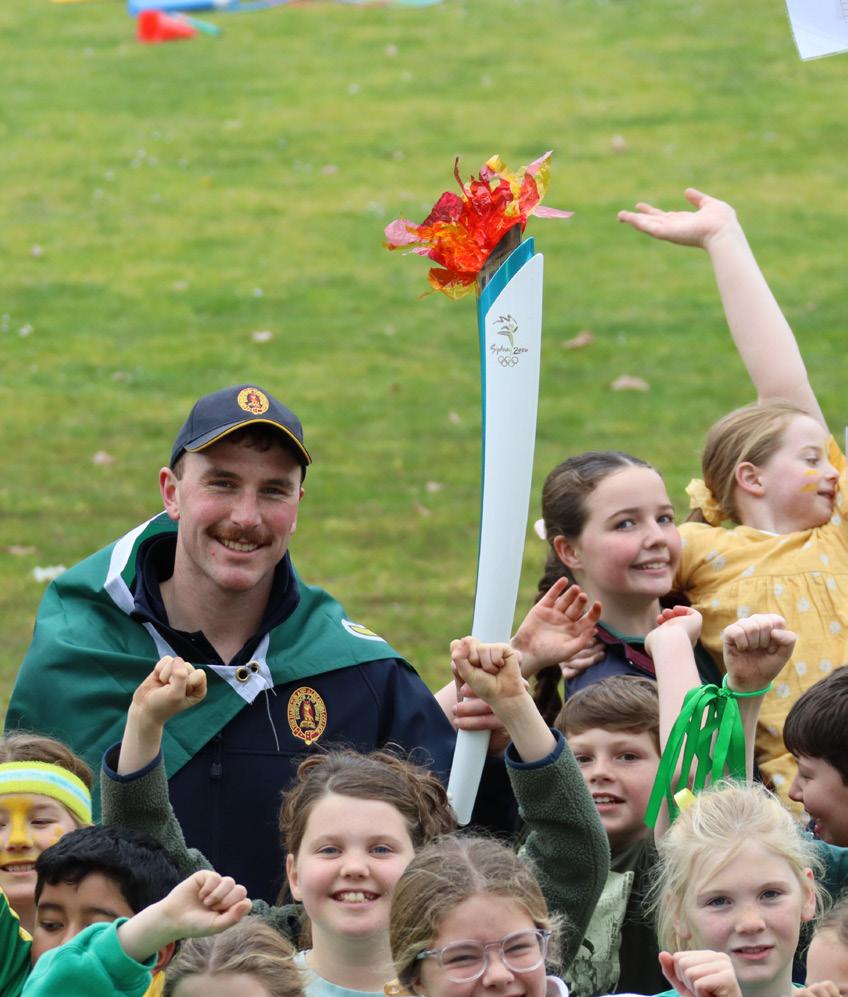
Music tutors – 10
Female 5 part time Male 5 part time
Co-curricular staff – 3
Female 3 part time
Cleaning staff – 9
Female 3 full time 2 part time
Male 4 part time
A list of staff qualifications is on page 11. It is also published annually in The Collandrian (College magazine) which is sent to all current families.
Our Professional Learning Program in 2024 was aligned clearly and explicitly with the strategic plan, carefully articulated to staff throughout the year. The program maintained its focus on high expectations, explicit instruction, and formative feedback while introducing key new initiatives that will
shape our teaching and learning practices moving forward. Our professional learning sessions used a range of strategies and techniques throughout the year, including face-to-face sessions, professional reading and discussion sessions, ensuring multiple pathways for staff engagement and learning.
The main focus of our 2024 Professional Learning program was the development of an Instructional Model for the College. This involved many sessions throughout the year, delivered through whole staff sessions, faculty groups, and individual coaching opportunities.
Centred on research and evidence in education, a significant component of our professional learning involved exploring the AERO model of how students learn and examining the implications for teaching practice. This research-based approach helped staff understand the “why” behind our professional learning focus areas, emphasizing the importance of consistency, cohesion of curriculum, building a common language among staff, and developing a clear, articulated understanding of what it means to teach and learn at College.
We also examined the balance between explicit instruction and inquiry-based learning models and the need for multiple approaches depending on the stage of the learner in the process. Staff engaged with the way in which different approaches suit different learners, recognising that this principle applies equally to both staff and students in their learning journeys.
Throughout the year, we explored routines and expectations within our classrooms, beginning the crucial process of auditing practice at an individual level. This work aimed to build staff capacity to understand that what we think we do and our actual practice can sometimes differ. We also recognised that two staff members can be using the same approach, technique, or activity, yet it may look very different or have different components in practice –hence the need for clarity and collaboration around our processes.
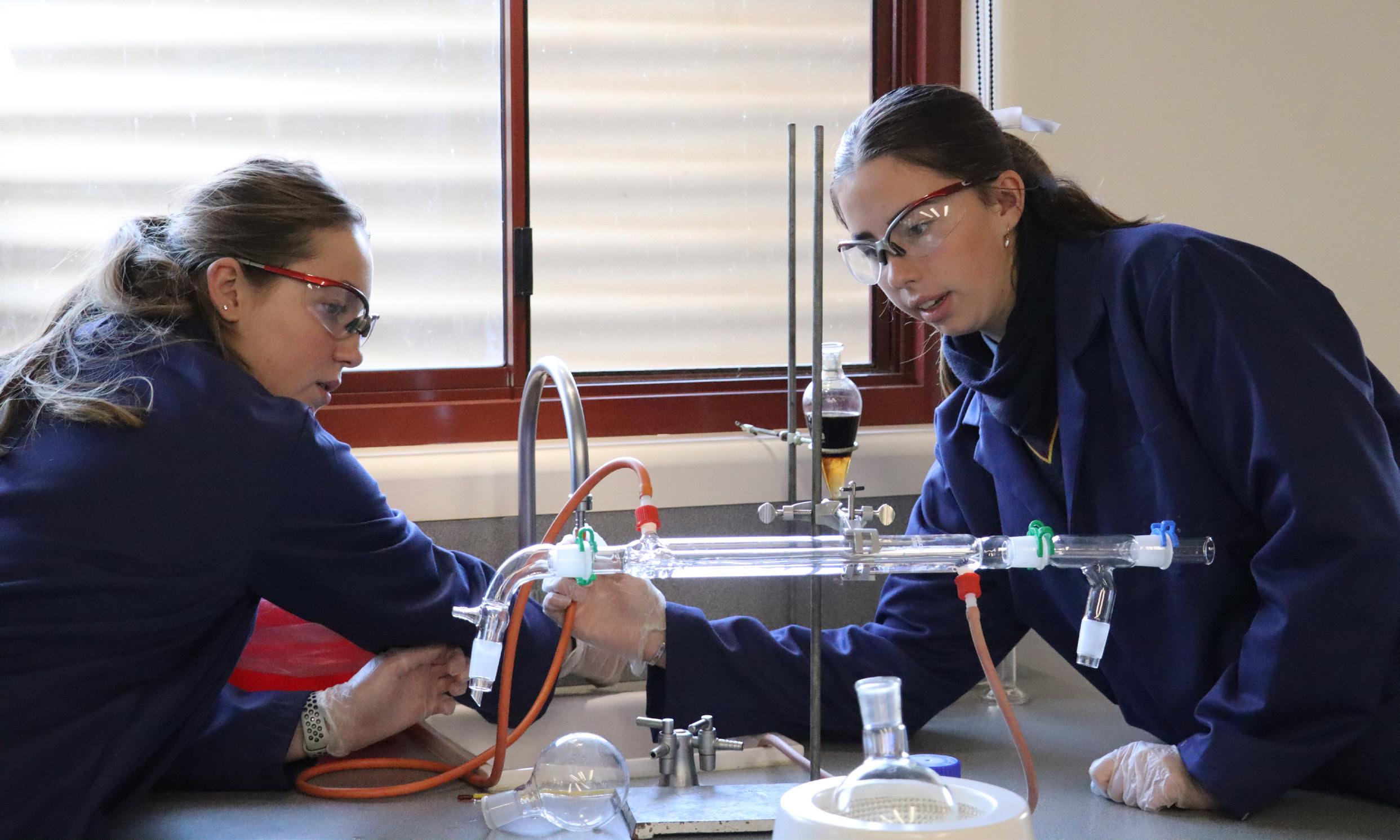
Building on our commitment to student wellbeing, we implemented a structured four-session program facilitated by BeYou, focusing on mental health and wellbeing:
Term 1: Responding to Student Mental Health Concerns - Staff developed skills and confidence in recognizing and responding appropriately to student mental health issues.
Term 2: Embedding SEL Across Your School - The focus shifted to integrating Social and Emotional Learning practices across all areas of school life.
Term 3: Connecting Your School Community - We explored strategies for strengthening connections between school, families, and the broader community.
Term 4: Whole School Approach to Critical Incidents - Staff learned frameworks for managing and responding to critical incidents that affect the school community.
We conducted a range of sessions focused on catering to and supporting students with diverse learning needs. Particular attention was given to developing our understanding of ADHD, ASD, and Executive Functioning challenges. These sessions highlighted the experience of the individual with the diagnosis to build staff knowledge, understanding, and empathy alongside practical capacity and skill building for meeting diverse needs in the classroom.
A dedicated group of staff attended the Leading Literacy Professional Learning Series presented by the Victorian Academy of Teaching and Leadership. The focus for this staff leadership initiative was Vocabulary Instruction, which will be implemented across the school in 2025. Four staff members from both Junior School and Senior School participated, ensuring whole-school representation and future implementation.
Junior School, Senior School and Boarding House staff attended an Instructional Coaching session with StepLab. This professional learning aligns with our Strategic Planning initiative to implement a comprehensive classroom observation program.
Growth Coaching remains a core part of our support for staff development and numerous staff across the school, from the Early Learning Centre, Junior School and Senior School have taken on the opportunity to work with our staff who are trained in Growth Coaching. This will continue to be a central offering, and we anticipate that there may be a need to train further staff as Growth Coaches in the future. This is distinct from the introduction of Instructional Coaches, which will be introduced in the future as part of the Classroom Observation program.
The Junior School teaching staff continue to engage with professional learning from Latrobe University’s Science of Learning and Reading Programs, The Writing Revolution and MultiLit.
Staff across the school participated in a range of external Professional Learning opportunities, including VCAA examiner reports, ‘Meet the Assessor’ programs, and workshops focused on quality teaching delivery. Several staff members served on VCAA boards and Subject Teaching Associations, further developing their knowledge of current curriculum developments and pedagogy.
The Professional Learning program of 2024 has established strong foundations for the implementation of our Instructional Model and prepared staff for the introduction of new initiatives in 2025, including the school-wide implementation of Vocabulary Instruction and the StepLab classroom observation program. This comprehensive approach ensures our continued commitment to excellence in teaching and learning while supporting the wellbeing and diverse needs of all our students.
All 2024 graduates successfully met the Victorian Certificate of Education requirements. Our ATAR results were strong, with 17% of Year 12 students achieving an ATAR above 90 and 35% scoring above 80%.
NAPLAN testing was conducted for Year 3, 5, 7 and 9 students. This data has been included in student profiles and data analysis in the SIMON Learning Management System, providing additional feedback to staff on student progress in Literacy and Numeracy.
In 2023 our students demonstrated strong development, gaining results at or above the state mean in the majority of areas tested.
This was the sixth year that College completed NAPLAN using the online format and the IT team enabled the testing process to be seamless.
Our results remain sound across all strands tested with students achieving at or above the national benchmark in each area tested. The overall benchmark scores suggest that our students are performing strongly in comparison to the state wide results
In Semester Two, our students in Years 2 to 6 participated in ICAS REACH Mathematics and ICAS Competition testing. This data collection enabled us to monitor growth and identify areas to target in internal teaching and learning.
Students were tested in English, Spelling and Mathematics assessments and students achieved an excellent set of results.
Results
• Outstanding – 3 students
• Commendable -12 students
Assessment Results
English
Spelling
Mathematics
• Distinction – 2 students
• Credit – 2 students
• Merit – 2 students
• Credit – 1 student
• Credit – 5 students
• Merit – 3 students
Academic achievement information is based on results from the Victorian Curriculum and Assessment Authority (VCAA). Our 2024 results were pleasing and demonstrated the school’s commitment to academic excellence and working closely with students to achieve their personal best.
NAPLAN results from 2024 (2023, 2022):
In 2024, we had a cohort of 58 Year 12 students, 52 of which completed a scored VCE Program and 6 opted for an unscored pathway.
• Dux achieved an ATAR of 97.8
• 17% achieved an ATAR above 90%
• 35% received an ATAR above 80%
• 54% of the cohort received an ATAR in the top 30% nationally
Vocational Education and Training (VET)
In 2024, 43 students across Years 10-12 studied a VET course:
• Equine (Go Tafe) - 3 students
Ag Cert II (SWTafe) – 3 students
• Ag Cert II (RIST) - 6 students
• Beauty Cert II – 1 studentBuilding and Construction Cert II – 1 student
• Engineering Cert II – 9 students
• Hospitality Cert II – 9 students
Ag Cert III (RIST) – 8 students
• Health Services Cert III – 1student
• Make Up Cert III – 2 students
Year 12 Tertiary Offers
• 90% applied for tertiary study 96% of these received a university offer
Victorian tertiary applications:
• 80% applied to Victorian universities
• 96% received an offer
• 94% received a first-round offer
• 20% of students received more than 1 VTAC offer
The greatest number of offers came from The University of Melbourne, Monash University and Deakin University..
Interstate tertiary applications:
• 21 interstate offers were received (all students who applied)
Most popular study areas:
• Engineering
• Science
• Psychology and Criminology
• Arts / Law
• Business
Beyond tertiary education
Six students did not apply for tertiary study and have secured:
• Apprenticeships - Agriculture
• Apprenticeship – Beauty
• Apprenticeship – Deisel Mechanic
• Work on stations / properties is New South Wales and Queensland.
In 2024 the following students were enrolled in VET courses: Go Tafe (equine) - 3
• Cert III in Health Services – 1
• Vet Engineering (Cert II) – 9 Cert III in Make Up – 2
• Cert II in Beauty – 1
• Cert II Building and Construction – 1 Cert II in Ag (SwTafe) – 3
• Cert II Ag (RIST) - 6
• Cert III Ag (RIST) – 8 Cert II in Hospitality – 9
• TOTAL Students enrolled in VET – 43
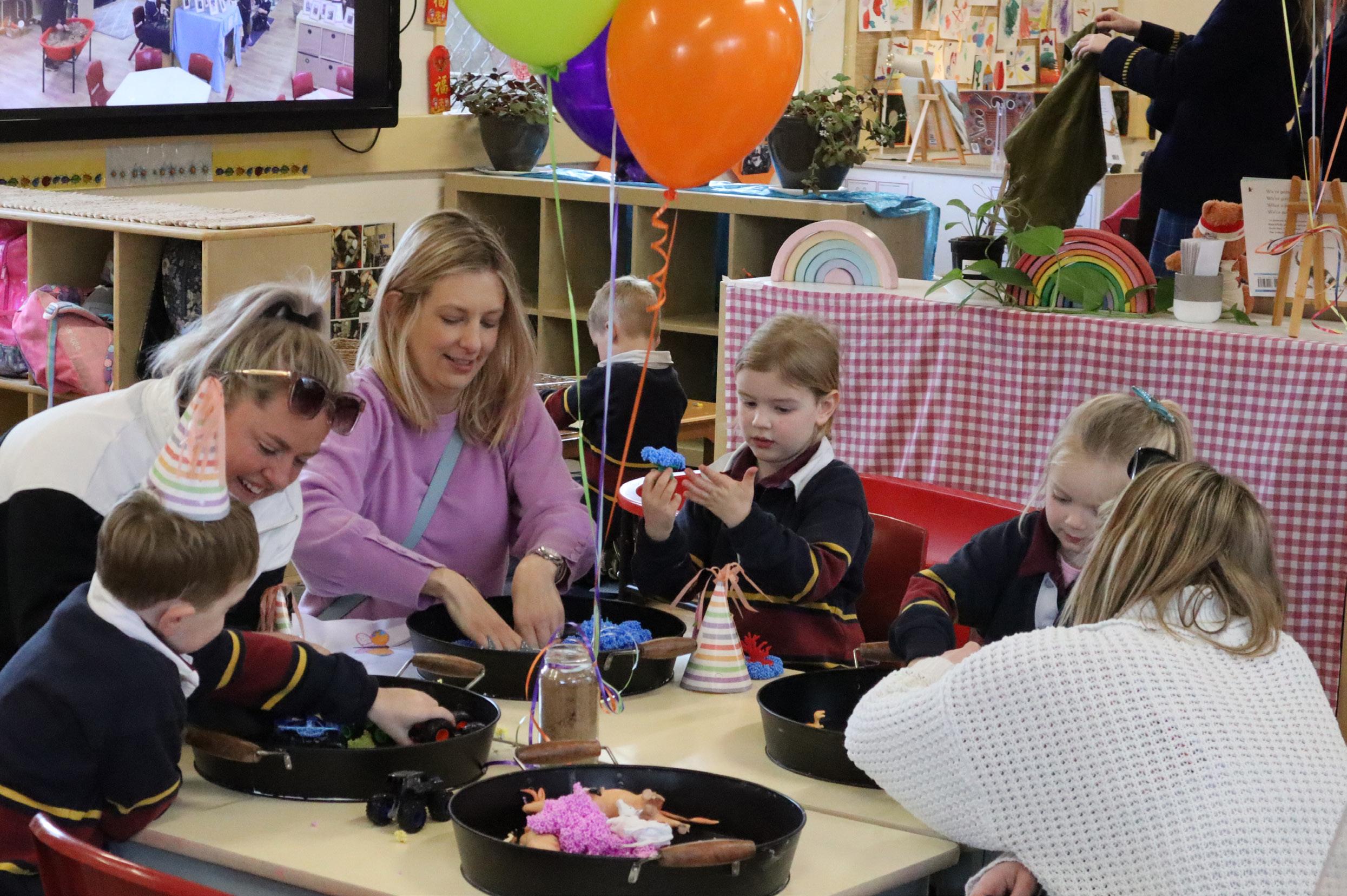
Toward the end of 2024, Lead School Effectiveness Surveys were sent to students, staff and parents to complete. The responses are compiled and compared against 146 independent schools through Independent Schools Victoria (ISV). Across Victoria, 216,556 students 61,034 staff and 153,951 parents completed the Lead survey which provides useful data.
8.16 I have access to high quality technology and resources that help me learn (ISV 7.89)
7.64 I am challenged in my learning at this school (ISV 7.49)
7.63 My teachers know and accept me (ISV 7.63)
7.40 My school gives me the opportunity to develop my interests and talents (ISV 7.18)
9.27 Teachers in this school know and care about students (ISV 9.13)
9.18 There is a broad range of cocurricular offerings at this school (ISV 8.47)
8.80 There is open communication between staff and parents at this school (ISV 8.57)
8.76 The school focuses on developing students as well rounded individuals (ISV 8.64)
8.56 There are excellent opportunities for contact with teachers at this school (ISV 8.32)
8.45 Students have access to high quality materials and resources that help them learn (ISV 8.30)
8.23 Teachers in this school know and care about my child (ISV 8.18)
7.55 My child is motivated to try out as many opportunities as possible at this school (ISV 7.41)
College also provided a number of forums for families to meet face-to-face with staff and provide feedback, with members of the Executive team and Board hosting dinners in Penola and Port Fairy, onsite curriculum evenings, parent / student / teacher interviews twice a year, held welcome drinks at the start of the year, a Year 7 information evening, attended field days in Lucindale and Wimmera, and visited agents and parents China, Hong Kong and Vietnam.
The Hamilton and Alexandra College Board is responsible for overall governance of the College, and together with the Principal, setting the strategic direction. The Board includes three subcommittees; Strategic Planning, Governance, and Finance which contribute to overall school governance.
BA (Hons), GAICD
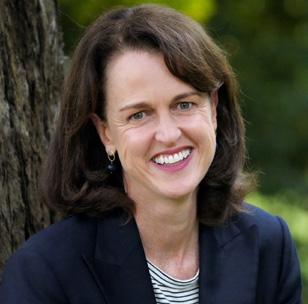
Rosie is the Board Chair, she joined the Board in 2017. Rosie and her husband David run a beef cattle and fine wool merino business near Penshurst along with a large-scale conservation venture in NSW. Rosie has a keen interest in education and the arts, particularly the fields of music, history and literature. She has maintained this interest through board and other voluntary positions with a number of educational and cultural organisations. Rosie is an Old Collegian, her eldest William graduated in 2023 and other children, Sophie and Rupert attend the College.
BCom (Acc), BEc, Chartered Accountant CA, Fellow of the Taxation Institute of Australia (FTIA)
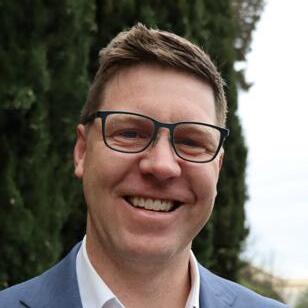
James joined the Board in June 2024 and is a Principal at Sinclair Wilson. James has worked as an Accountant, providing industry best standard Taxation and Business Advice, for more than 10 years. James’s role oversees teams in Hamilton, Mount Gambier, and Warrnambool and his passion is working with family businesses across a large range of industries. James lives in Port Fairy with his family, where he is active in the community, from a patrolling surf club member to a member of the Finance and Risk committee of the Port Fairy Community Bendigo Bank.
BA, DipEd
Roslyn joined the Board in 2017. She has a degree in English and Politics from University of Melbourne and a Diploma in Education. Roslyn taught senior English and History in country Victoria, Melbourne and Sydney, and lived Perth for several years. In between teaching appointments, Roslyn worked in the airline and beef cattle industries. Roslyn’s family retains farming interests at Mortlake.
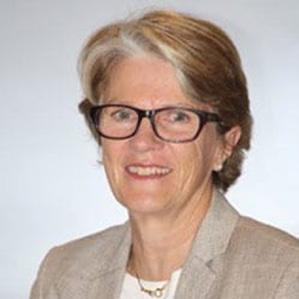
BBus, MEd, DipVet, FAICD
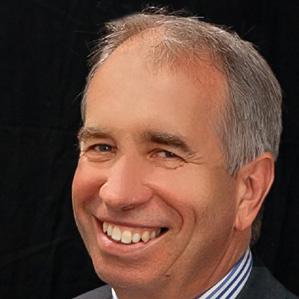
Bill joined the Board 2012. He is currently Deputy Chair, Chair of the Finance Committee and is the former Chair of the College Foundation. Bill is Chief Executive Officer of Rural Industries Skill Training (RIST), a leading national agricultural training organisation based in Hamilton. Bill grew up in rural Australia and has maintained this connection with the agricultural sector through senior management and board positions with a range of national organisations servicing country Australia. Bill and Kathryn’s three children, Calder (2008), Conrad (2010) and Anastasia (2012) all attended the College.
MPhil (Economics), BCom (Hons), LLB (Hons)
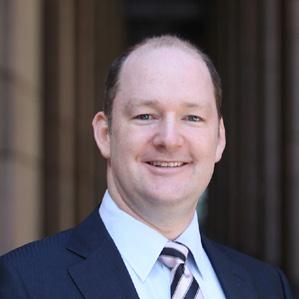
David joined the Board in 2021. Originally from Digby, David now lives in Melbourne. He is a Partner with McKinsey & Company, where he leads the Melbourne Office and serves resources, finance and public sector clients in Australia and Asia. He has studied at both The University Melbourne and Oxford University in England and has expertise in strategy, organisation, reputation and sustainability. David has a strong interest in education and mental health and also serves on the Steering Committee for Beyond Blue’s ‘Be You’ mental health initiative for schools and early learning services. David is an Old Collegian (1992).
BA, DipEd, MACE, MACEL
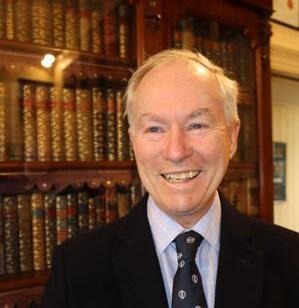
Neil joined the Board in May 2024. He is a retired teacher who commenced his teaching career at the College in 1978. In subsequent years, he had experience in a range of curricular and co-curricular roles and was Deputy to four Principals. At times, he was Acting Principal. Neil’s knowledge of the College community gained through these experiences and his care of the College Archives and authorship of the sesquicentenary history of the College give him a sound awareness of the opportunities for, and challenges and needs of, a school like the College. Neil’s two daughters are Old Collegians, Catherine (2009) and Annie (2012).
BBus (Ag Comm), LLB
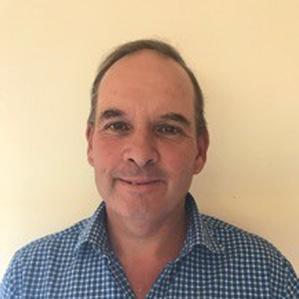
Sam joined the Board in 2017, he is a farmer in Harrow specialising in wool, sheepmeat and cropping. He is a member of the local CFA and has held the role of Secretary/Treasurer for over 15 years. Sam has a strong interest in local education, having served on the Harrow local school council for 10 years. He has also been involved in many roles in the local sporting clubs and associations, having a particular interest in cricket, playing at both College and Pigeon Ponds. Sam’s three children are Old Collegians, Lucy (2022), Fergus (2021) and Claudia (2018).
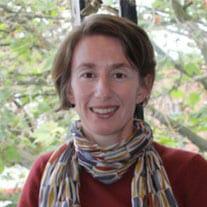
BArch (Hons) Registered Architect Bianca Scaife joined in 2016 and retired from the Board in May 2024. She made a significant impact during her time on the Board, particularly in the role as Chair of Strategic Planning. Bianca and her husband, Daniel Cooper, are Directors of Cooper Scaife Architects, established in Hamilton in 2003. Bianca is an Old Collegian (1991), and her son is an Old Collegian, Milo (2021)
BSc, MSc(Ag)
Freya joined the Board in November 2024. Freya is involved in running a commercial sheep enterprise with her husband Richard on their farm near Apsley. Previously, Freya worked as an agricultural research scientist with the South Australian Research and Development Institute. Freya has a strong interest in education and served on their local school’s council where she was involved in implementing new programs. Freya and her husband Richard (Old Collegian 1994) have three children at the College, Sidney, Scarlett and Frederick.
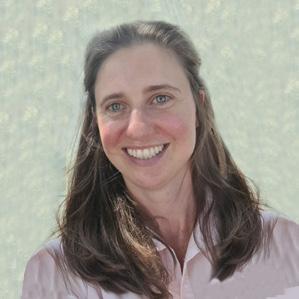
MPharm JP
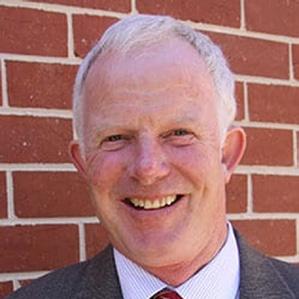
Nigel joined the College Board in 2012 and is a member of the Governance and Finance Committees. With a background in retail pharmacy ownership and management, he is now a farmer with a commercial beef herd. His farming interests also include cropping and several conservation projects to provide habitat and retard degradation. Nigel’s two children are Old Collegians, Henry (2015) and Claire (2017).
BScMechEng RMIT
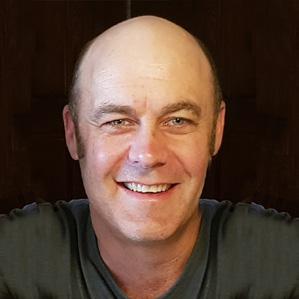
David joined in 2021 and retired from the Board in October 2024. David was raised in Penshurst and is the Managing Director of Thornton Engineering Australia Pty Ltd. The business was founded in 1975 in Penshurst and since moving the business to Geelong in 2000, it has grown to be a market leader, employing over 180 staff and supplying nationally and internationally. David is an Old Collegian (1990).
Principal
Mr M Horne DEd, Grad DipEd, BA (Hons), Med, GAICD
Deputy Principal Wellbeing
Miss K Waldron MEd, BEd
Director of Learning and Teaching
Mrs A Robertson MEd, BEd
Head of the Junior School
Mr S Nelson BEd, DipEd
Director of Boarding/Head of Physical Education
Mr A Monk MEd
Business Manager
Mr J Bourke BCom
Director of Community Relations
Mrs A Brown BA (Public Relations)
Mrs L Addinsall GradDipEd, DipVisArts, Advanced DipBusMgt
Mr L Alexander BAppSc, BTch Head of Outdoor Education
Mrs P Alexander BTch
Miss A Andrews BSc, BNur, GradDipEd
Mrs J Bell BA (Hons), MTch(Prim), MAPP
Mr J Bell BA Human Movement, GradDipEd, GradCert Outdoor Education
Ms V Bolton BA, GradDipI&T (Spanish), GradDipEd (Secondary) GradCertSpecialEd, Head of Learning Enhancement
Mrs R Bonnett BSc BEd, MEd in Research, Head of VCE Studies and Head of Science
Miss S Brabham BA, BTch (parental leave)
Mr H Burmeister MSc Biochemistry, PostGradeCertEd, Head of Young
Mrs P Callinan BAppSci (Planning), BTch (Hons)
Mrs A Cameron BHlthSci (Hons), MEd
Mrs B Cameron BEd
Mr T Cameron BEng (Elec) (Hons), MTch
Mr P Carroll BSc (Hons), DipEd
Mr J Chen BSc, GradDipEd, MA
Mrs AK Christie BEd M Mus Adv Dip (Kodaly Institute of Music Pedagogy, Hungary)
Mrs S Covill BEd(Sec), BAppLing (Term 1)
Mrs P Cowland DipEd (Primary), MTch
Mrs A Churchill BArts, BTch, MEd
Mrs D Davis BCom, DipEd, Head of Mathematics
Mrs K Dempsey BA, GradDipEd Head of Library
Mr S Dempsey BSc, DipEd
Miss E Dixon BExSc, MTch, Director of Sport
Mr E Gong BA, GDipEd (Sec), MTch (EAL/ Chinese), Head of LOTE
Mr J Guez BBus, GradDipEd
Mr B Hawthorne PhD, MEd, BEd, BApp Sci (Exercise and Sport), Postgrad Cert Ed Research Head of Middle Years
Mr T Hawthorne BEd (Primary), BA
Mrs E Hausler BEd (Secondary Physical Education) Head of Year 9 Experience
Mrs H Henry BA, BEd, Head of English
Mr B Hiscock BMus, GradDipEd, Director of Music
Mrs E James BEdVisArts, Head of Art
Miss E Johnson BA (Literature and History) and MTch (Secondary)
Mrs B Keiller DipT, GradDipEd (Theology)
Mrs S Kelly DipEd, GradDip SpecEd-Integration
Miss A Kenna BA, MTch Head of Drama
Miss K Krstonosic BBus, BA
Mr G Lewis BTRP (Hons), GradDipEd, BSci (Botany and Zoology) (Hons)
Ms S MacLeod GDipAppL, BA (Politics and Policy Studies)
Mrs S Malseed B Man, DipEd
Mrs L Manifold MEd BEd DipEd (Childhood Education) GradDip (Special Ed) GradDip (Careers)
Mrs M McDonald DipHosp & Mgt, AdvDipAgri, Cert IV Training & Assessment
Mrs S McMullen B Science, DipEd, Head of Laidlaw House
Mrs B Milich BEd, B Arts Ed Head of Lower Primary
Mr V Naidu BSc (Hons), MTch
Mrs B Nichols BA, DipEd, Head of Learmonth
Mrs J Ogle BA, BEd, TOPS, Head of History and Humanities
Mrs L Patterson BEd
Ms J Porter BEd
Mrs N Prosser BA BT MEd, Head of Berry, Director of Horsemanship (Term 1, 2 and 3)
Miss H Reiher MEd (Student Wellbeing), BEd, Head of Senior Years and Head of Careers
Mrs K Schulz EEd, DipTch
Miss P See BPsych (Hons), MTch (parental leave)
Mrs M Simkin MEd (Teacher-Librarianship), MEd (Knowledge Networks and Digital Innovation), BA, DipEd
Mr B Singh BMus GradDip (Instr Perf) MMus (Music Studies), MTch(Sec)
Mr P Steer BSc, DipEd, MEd, MCSE, CCNA, CCAI
Mrs L Williams BEd
Miss T Winstanley BECE (Prim)
Mrs K Winter Cooke BEcon, GradDipEd, Daily Organiser
Ms Q Wu BEd
Penny Adamson (President)
Graeme Linke (Vice President)
Natalie Bawden
James Callinan
Adam Dickson
Jen Hutton
Hugh Macdonald
Alex Robinson
Marcus Winter Cooke
Hugh Koch (President)
Kristabel Lewis (Secretary)
Jane Young (Treasurer)
Narelle Hill (President)
Zoe Price (Vice President)
Stacey Balkin (Treasurer)
Phoebe Giles (Secretary)
